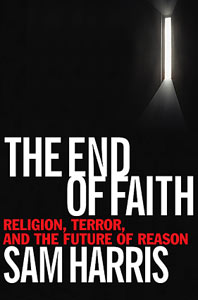The End of Faith

Cover of the first edition
|
|
| Author | Sam Harris |
|---|---|
| Country | United States |
| Language | English |
| Subject | Religion |
| Publisher | W. W. Norton |
|
Publication date
|
August 11, 2004 |
| Media type | Print (Hardcover and Paperback) |
| Pages | 349 (paperback) 336 (Hardcover) |
| ISBN | |
| OCLC | 62265386 |
The End of Faith: Religion, Terror, and the Future of Reason is a 2004 book by Sam Harris, concerning organized religion, the clash between religious faith and rational thought, and the problems of tolerance towards religious fundamentalism.
Harris began writing the book in what he described as a period of "collective grief and stupefaction" following the September 11, 2001 attacks. The book comprises a wide-ranging criticism of all styles of religious belief.
The book was first published August 11, 2004, and it was awarded the PEN/Martha Albrand Award for First Nonfiction the following year. The paperback edition was published in October 2005. In the same month it entered The New York Times Best Seller list at number four, and remained on the list for a total of 33 weeks.
The End of Faith opens with a literary account of a day in the life of a suicide bomber – his last day. In an introductory chapter, Harris calls for an end to respect and tolerance for the competing belief systems of religion, which he describes as being "all equally uncontaminated by evidence". While focusing on the dangers posed by religious extremist groups now armed with weapons of mass destruction, Harris is equally critical of religious moderation, which he describes as "the context in which religious violence can never be adequately opposed."
Harris continues by examining the nature of belief itself, challenging the notion that we can in any sense enjoy freedom of belief, and arguing that "belief is a fount of action in potentia." Instead he posits that in order to be useful, beliefs must be both logically coherent, and truly representative of the real world. Insofar as religious belief fails to ground itself in empirical evidence, Harris likens religion to a form of mental illness which, he says, "allows otherwise normal human beings to reap the fruits of madness and consider them holy." He argues that there may be "sanity in numbers", but that it is "merely an accident of history that it is considered normal in our society to believe that the Creator of the universe can hear your prayers, while it is demonstrative of mental illness to believe that he is communicating with you by having the rain tap in Morse code on your bedroom window."
...
Wikipedia
